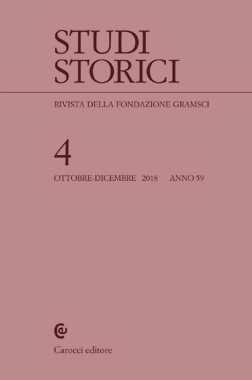
luglio - settembre 2014 anno 55
Sommario e abstract degli articoli
Miriam Turrini, pp. 585-614
Poco oltre la soglia: racconti autobiografici di aspiranti gesuiti a metà Seicento
Just beyond the threshold: autobiographical stories of aspiring Jesuits in the mid-seventeenth century
The collection of more than eighty questionnaires and autobiographical stories of vocation compiled by candidates to enter the Society of Jesus during the period of first probation, covering the years 1636-1643, conserved in the Archivum Romanum Societatis Iesu, offers us the opportunity to learn new types of «Egodocuments». Very young novices, youths and adults are subjected to an examination to find if they are qualified to become Jesuits. The source is important because they are texts written largely by teenagers and young people, whose voice is rarely heard directly in documents before the end of the eighteenth century, and because the interior and exterior discernment of a vocation in the early modern period is an aspect of religious experience very little studied so far. The essay is an initial approach to such documentary material. A presentation of the source, its characteristics and difficulties of interpretation, is followed by an analysis of the responses and autobiographical narratives by novices about their origins, their lives before entering the novitiate, family relationships, their social lives, their feelings of childhood and death, and their projection towards religious experience in the Society of Jesus.
Federica Bertagna, pp. 615-644
Techint e gli altri. Penetrazione industriale ed emigrazione italiana nell’Argentina peronista (1946-1955)
Techint and others. Industrial penetration and Italian emigration to Peronist Argentina
This work analyzes the combination of Italian immigration and industrial penetration in Argentina during the first Peron era (1946-1955). It studies the transfer of Italian companies with all their staff and machinery to Argentina as part of the Argentinean government’s industrialization policy, analyzing the characteristics of a phenomenon that involved many firms and thousands of workers, and focusing in particular on five examples of Italian firms established in Argentina during this period. Using primary qualitative sources, both Italian and Argentine, the article proposes some hypotheses on the centrality of this new combination between Italian immigration and industrial penetration in the development of Argentina’s industry after the Second World War.
Luca Bufarale, pp. 645-669
Riccardo Lombardi e la nazionalizzazione dell’energia elettrica
Riccardo Lombardi and the nationalization of electric energy
At the end of 1962, the Italian government decided to nationalize all its electricity enterprises following the example of France and the UK, which had created their state-controlled electricity industry after the Second World War. This was one of the most important reforms decided upon by the first centre-left coalition born in 1962 and based on a collaboration between the Socialists, the Christian Democratic Party and two other small parties. The article focuses on Riccardo Lombardi, a Socialist leader who was one of the leading figures of this reform. Lombardi began his struggle in the late 1940s, denouncing the situation of the private electricity monopolies. In 1962, he collaborated towards creating a public enterprise, strongly defending the new law both from opposition on the right and from criticisms from the Communist Party. However, the conservative forces managed to have considerable changes made to the reform as it was originally conceived. Lombardi failed in his opposition to the decision to provide compensation to enterprises rather than to shareholders, and in his attempt to carry out economic planning using the new state-controlled enterprise to help underdeveloped areas. Lombardi’s disappointment with the reform, and his progressive disillusionment over the capabilities of the centre-left coalition, show all the contradictions of this important political experiment.
Giorgio Fabre, pp. 671-698
Il caso Hochhuth
The Hochhuth case
The stunning success of Rolf Hochhuth’s play The Deputy (1963) was no accident. Carefully planned, with renowned German theatre director and producer Erwin Piscator, to be a mass-media breakthrough, it also benefitted from a harsh article written by Cardinal Montini before he became he became Pope Paul VI, but published in «L’Osservatore Romano» after his election. This essay focuses on several papal interventions against Hochhuth’s play and in defence of Pius XII – the target of The Deputy. Thenceforth questions of «Pius XII and Holocaust» and «Pius XII and the Jews» arose and became a never-ending dispute. In the meantime, the Second Vatican Council condemned anti-Semitism (but not the Holocaust). Following the Pope’s intervention, several scholars and political personalities – among them Italian statesman Giulio Andreotti, the former Israeli Consul in Milan Pinchas Lapide, and Holocaust historian Saul Friedländer – joined the dispute.
Elena Bacchin, pp. 699-726
«I comitati sono due, anzi due i Savonarola». Identità e tensioni politico-religiose durante il Concilio Vaticano I
«The committees are two, in fact both Savonarola». Identity and political and religious tensions during the First Vatican Council
While in 1869, with the First Vatican Council, the Catholic Church attempted to affirm the vitality of the papacy and to stress the importance of the transcendent foundation of society, in Florence – the capital of the new Italian Kingdom – three committees were founded to build three different statues of Girolamo Savonarola. Through this case study and the images of the Medieval friar developed in those years,this essay offers an insight on the relationships between religion, politics and Italian identities in the few years after Unification. Debates, tensions and solutions on the role of the Catholic Church within Italian society were developed as part of a «cultural war» with a European dimension, involving values, practices, and loyalty. Since religion played a fundamental role in the Italian national-patriotic discourse, a Dominican friar became a slogan, a useful tool in the political battle, and his life was distorted according to convenience, even by anti-Catholics and anticlericals. Savonarola embodied the ambition of different political visions: a society in which Catholicism and freedom were in communication, or a society without religion and in which the papacy had lost its powers. Liberal Catholics, Freemasons, freethinkers, radicals, and Protestants were involved in these re-elaborations of Savonarola’s image with different aims; but with the capture of Rome all hope for reform and renewal of the Church, as well as all hopes for a weakening of Catholicism, had faded.
Maria Luisa Righi, pp. 727-757
Gli esordi di Gramsci al «Grido del popolo» e all’«Avanti!» (1915-1916)
Gramsci’s beginnings at «Il Grido del Popolo» and «Avanti!» (1915-1916)
This paper reconstructs Antonio Gramsci’s early forays into journalism for the Socialist weekly «Il Grido del Popolo» and on the editorial team for the Turin page of the daily «Avanti!» between late 1915 and May 1916. It outlines the political and cultural profiles of the other journalists with whom Gramsci worked, and pays particular attention to Giuseppe Bianchi, who directed both «Il Grido del Popolo» and «Avanti!» during the period examined. Based on this examination, the paper proposes that the paternity of some of the articles previously thought to be Gramsci’s should no longer be recognized, while others should now be attributed to him. The appendix presents Barbonite, an article published anonymously in «Il Grido del Popolo» in January 1916, in which the author, presumed to be Gramsci, confesses he has overcome his former interventionist stance.
Giovanni Cavagnini, pp. 759-777
L’ombra lunga del fascismo. Sul mito di Giosuè Borsi nell’Italia repubblicana
The long shadow of fascism. On the myth of Giosuè Borsi in Republican Italy
This article focuses on the memory of Giosuè Borsi in Italy after the fall of the fascist regime. A Catholic soldier fallen on the Isonzo battlefield in 1915, the Tuscan poet was celebrated in the 1920s and the 1930s as the symbol of the cult of the Fatherland, but the end of Mussolini’s dictatorship brought drastic change. In postwar Italy, nationalism became a lesser issue and Borsi was almost forgotten until the mid-1950s, when the memory of the World War I hero re-emerged. After reaching its peak a decade later, Borsi’s myth began to decline and by the 1980s it endured only in Livorno, where the poet was born. His posthumous fortunes shed light on the long-term consequences of the mixing of Catholicism and nationalism that took place in Italy during the fascist era, providing evidence that the process did not end in 1945. In fact, not even the encyclical letter Pacem in terris (1963) marked a turning point for Borsi’s admirers, who continued to glorify him despite the social, cultural and political changes.
Ivana Ait, pp. 779-787
Un valore aggiunto delle donne: il credito
An added value for women: credit
The proceedings of a congress held in Asti offer a starting point for a reflection on women and the business world. Credit, in the sense of respect and trust, turns out to be a crucial tool for women of different social backgrounds and different geographical areas, which allows them to fully participate in different forms of investment. After significant research on the role of women in handicraft production, this interpretation becomes crucial for shedding light on the business networks that women are able to create in the society in which they live. This all-female context is composed of wives, widows, and mothers who invest their capital, in most cases consisting of their dowry, in operations of greater or lesser risk: loans with or without pawning, stakes in companies, and so on. Through an extensive set of documents of various kinds, it is possible to reconstruct the varied and complex business world of women who, on their own or in partnerships, succeeded in starting up and increasing their capital.
Sfoglia gli altri numeri dell’anno 55 / 2014
Elenco dei fascicoli pubblicati dal 2010
Seleziona fascicolo...
- anno 65 / 2024
- 1
- 2
- 3
- anno 64 / 2023
- 1
- 2
- 3
- 4
- anno 63 / 2022
- 1
- 2
- 3
- 4
- anno 62 / 2021
- 1
- 2
- 3
- 4
- anno 61 / 2020
- 1
- 2
- 3
- 4
- anno 60 / 2019
- 1
- 2
- 3
- 4
- anno 59 / 2018
- 1
- 2
- 3
- 4
- anno 58 / 2017
- 1
- 2
- 3
- 4
- anno 57 / 2016
- 1
- 2
- 3
- 4
- anno 56 / 2015
- 1
- 2
- 3
- 4
- anno 55 / 2014
- 1
- 2
- 3
- 4
- anno 54 / 2013
- 1
- 2
- 3
- 4
- anno 53 / 2012
- 1
- 2
- 3
- 4
- anno 52 / 2011
- 1
- 2
- 3
- 4
- anno 51 / 2010
- 1
- 2
- 3
- 4
